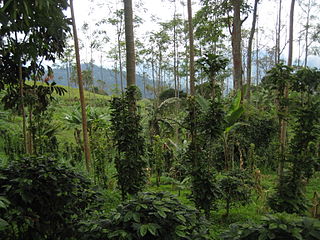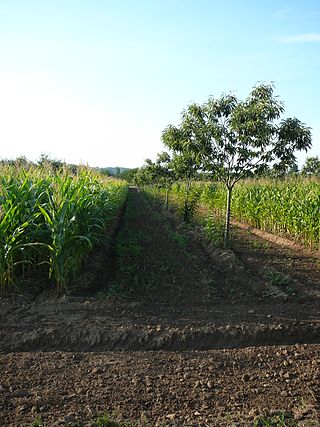The following outline is provided as an overview of and topical guide to sustainable agriculture:

Sustainable agriculture is farming in sustainable ways meeting society's present food and textile needs, without compromising the ability for current or future generations to meet their needs. It can be based on an understanding of ecosystem services. There are many methods to increase the sustainability of agriculture. When developing agriculture within sustainable food systems, it is important to develop flexible business processes and farming practices. Agriculture has an enormous environmental footprint, playing a significant role in causing climate change, water scarcity, water pollution, land degradation, deforestation and other processes; it is simultaneously causing environmental changes and being impacted by these changes. Sustainable agriculture consists of environment friendly methods of farming that allow the production of crops or livestock without causing damage to human or natural systems. It involves preventing adverse effects on soil, water, biodiversity, and surrounding or downstream resources, as well as to those working or living on the farm or in neighboring areas. Elements of sustainable agriculture can include permaculture, agroforestry, mixed farming, multiple cropping, and crop rotation.
Agroecology is an academic discipline that studies ecological processes applied to agricultural production systems. Bringing ecological principles to bear can suggest new management approaches in agroecosystems. The term can refer to a science, a movement, or an agricultural practice. Agroecologists study a variety of agroecosystems. The field of agroecology is not associated with any one particular method of farming, whether it be organic, regenerative, integrated, or industrial, intensive or extensive, although some use the name specifically for alternative agriculture.

Urban agriculture refers to various practices of cultivating, processing, and distributing food in urban areas. The term also applies to the area activities of animal husbandry, aquaculture, beekeeping, and horticulture in an urban context. Urban agriculture is distinguished from peri-urban agriculture, which takes place in rural areas at the edge of suburbs.

A market garden is the relatively small-scale production of fruits, vegetables and flowers as cash crops, frequently sold directly to consumers and restaurants. The diversity of crops grown on a small area of land, typically from under 0.40 hectares to some hectares, or sometimes in greenhouses, distinguishes it from other types of farming. A market garden is sometimes called a truck farm in the USA.
Agribusiness is the industry, enterprises, and the field of study of value chains in agriculture and in the bio-economy, in which case it is also called bio-business or bio-enterprise. The primary goal of agribusiness is to maximize profit while satisfying the needs of consumers for products related to natural resources such as biotechnology, farms, food, forestry, fisheries, fuel, and fiber.

Seed companies produce and sell seeds for flowers, fruits and vegetables to commercial growers and amateur gardeners. The production of seed is a multibillion-dollar global business, which uses growing facilities and growing locations worldwide. While most of the seed is produced by large specialist growers, large amounts are also produced by small growers who produce only one to a few crop types. The larger companies supply seed both to commercial resellers and wholesalers. The resellers and wholesalers sell to vegetable and fruit growers, and to companies who package seed into packets and sell them on to the amateur gardener.

Agroforestry is a land use management system that integrates trees with crops or pasture. It combines agricultural and forestry technologies. As a polyculture system, an agroforestry system can produce timber and wood products, fruits, nuts, other edible plant products, edible mushrooms, medicinal plants, ornamental plants, animals and animal products, and other products from both domesticated and wild species.
Biointensive agriculture is an organic agricultural system that focuses on achieving maximum yields from a minimum area of land, while simultaneously increasing biodiversity and sustaining the soil fertility. The goal of the method is long term sustainability on a closed system basis. It is particularly effective for backyard gardeners and smallholder farmers in developing countries, and also has been used successfully on small-scale commercial farms.

An heirloom plant, heirloom variety, heritage fruit, or heirloom vegetable is an old cultivar of a plant used for food that is grown and maintained by gardeners and farmers, particularly in isolated communities of the Western world. These were commonly grown during earlier periods in human history, but are not used in modern large-scale agriculture.

Urban horticulture is the science and study of the growing plants in an urban environment. It focuses on the functional use of horticulture so as to maintain and improve the surrounding urban area. Urban horticulture has seen an increase in attention with the global trend of urbanization and works to study the harvest, aesthetic, architectural, recreational and psychological purposes and effects of plants in urban environments.

Agriculture in Ethiopia is the foundation of the country's economy, accounting for half of gross domestic product (GDP), 83.9% of exports, and 80% of total employment.

Agroecology is an applied science that involves the adaptation of ecological concepts to the structure, performance, and management of sustainable agroecosystems. In Latin America, agroecological practices have a long history and vary between regions but share three main approaches or levels: plot scale, farm scale, and food system scale. Agroecology in Latin American countries can be used as a tool for providing both ecological, economic, and social benefits to the communities that practice it, as well as maintaining high biodiversity and providing refuges for flora and fauna in these countries. Due to its broad scope and versatility, it is often referred to as "a science, a movement, a practice."
Miguel Altieri is a Chilean born agronomist and entomologist. He is a Professor of Agroecology at the University of California, Berkeley in the Department of Environmental Science, Policy and Management.

Natural farming, also referred to as "the Fukuoka Method", "the natural way of farming", or "do-nothing farming", is an ecological farming approach established by Masanobu Fukuoka (1913–2008). Fukuoka, a Japanese farmer and philosopher, introduced the term in his 1975 book The One-Straw Revolution. The title refers not to lack of effort, but to the avoidance of manufactured inputs and equipment. Natural farming is related to fertility farming, organic farming, sustainable agriculture, agroecology, agroforestry, ecoagriculture and permaculture, but should be distinguished from biodynamic agriculture.

Community gardens in the United States benefit both gardeners and society at large. Community gardens provide fresh produce to gardeners and their friends and neighbors. They provide a place of connection to nature and to other people. In a wider sense, community gardens provide green space, a habitat for insects and animals, sites for gardening education, and beautification of the local area. Community gardens provide access to land to those who otherwise could not have a garden, such as apartment-dwellers, the elderly, and the homeless. Many gardens resemble European allotment gardens, with plots or boxes where individuals and families can grow vegetables and flowers, including a number which began as victory gardens during World War II. Other gardens are worked as community farms with no individual plots at all, similar to urban farms.
Costa Rican agriculture plays a profound part in the country's gross domestic product (GDP). It makes up about 6.5% of Costa Rica's GDP, and 14% of the labor force. Depending upon location and altitude, many regions differ in agricultural crops and techniques. The main exports include: bananas, pineapples, coffee, sugar, rice, vegetables, tropical fruits, ornamental plants, corn, potatoes and palm oil.
Occupy the Farm is an ongoing social movement that started with the 2012 occupation of the Gill Tract in Albany, California, in protest of planned commercial development of public land and in support of preserving the land for the creation of an open center for urban agroecology and food sovereignty.

Foodscaping is a modern term for the practice of integrating edible plants into ornamental landscapes. It is also referred to as edible landscaping and has been described as a crossbreed between landscaping and farming. As an ideology, foodscaping aims to show that edible plants are not only consumable but can also be appreciated for their aesthetic qualities. Foodscaping spaces are seen as multi-functional landscapes which are visually attractive and also provide edible returns. Foodscaping is a great way to provide fresh food in an affordable way.
A number of movements seek to expand the practice of agroecology in West Africa. Agroecology is a scientific discipline, movement and practice that integrates ecology in agriculture with strong emphasis on diversification, food sovereignty, energy efficiency and sustainability. Agroecological practices apply the systems and knowledge that traditional farmers in the region have developed and inherited. The agroecological social movement empowers smallholder farmers that hold the knowledge of indigenous farming systems, however are recently engulfed by larger farms or are migrating to urban areas, looking for better paying jobs.














